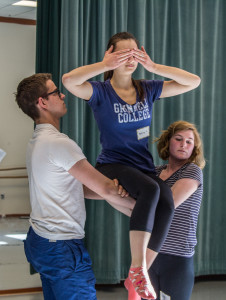It’s no revelation that Grinnell students are tired, stressed and ambitious. While many may see this abundance of work as necessary for a quality education, Professor Jonathan Miller-Lane, of Middlebury College, sees this trend as problematic. Miller-Lane views this emphasis on work and productivity as the root cause behind many of the health and societal problems that liberal arts colleges face today. In his talk and workshop on Monday, April 27th, Miller-Lane outlined a new type of liberal arts experience, one that incorporates multiple types of learning, including physical learning and contemplative practices, to achieve an education that is balanced and centered in the present moment.
Miller-Lane, who is the associate director of the Educational Studies Program at Middlebury, was brought in through a coordinated effort between the Theatre and Dance Department and the Department of Athletics. Miller-Lane’s speech was entitled “The Embodied Life”, and focused on how to include the body under definitions of academic learning. Instead of simply acquiring reams of knowledge, Miller-Lane hopes that professors embrace a more holistic version of education.
“Here’s my dream, an academic department sitting down and saying ‘what are the best ways [for students] to acquire the dispositions and skills we want,” said Miller-Lane.
Much of the problem of body neglect in academics stems from an unhealthy focus on productivity, which takes students away from the present moment. Miller-Lane views the current “Work Hard, Play Hard,” mentality as emblematic of bigger issues of how we see our meaning connected with our level of stress and work. To illustrate this point, Miller-Lane shared a quote from the 20th century, mystic monk, Thomas Merton:
“The rush and pressure of modern life are a form, perhaps the most common form, of its innate violence. To allow oneself to be carried away by a multitude of conflicting concerns, to surrender to too many demands, to commit oneself to too many projects, to want to help everyone in everything is to succumb to violence.”
Instead of constantly subjecting ourselves to the “violence of busyness”, Miller-Lane suggests that our educational experience should be rooted in contemplative practice. As the founder of the Blue Heron Aikido Center in Middlebury, Vermont, Miller-Lane sees contemplative practice as encompassing more than just meditation, and that athletics and martial arts can fill a similar role. It is important however, to attach the performance with stillness and focus. To demonstrate, Miller-Lane had the audience rise to their feet and perform a loud rendition of the traditional “Kiai” shout that is used in Aikido.
“The idea of Kiai shout is to connect the motion with a place of stillness,” said Miller-Lane.
Earlier in the day, Miller-Lane demonstrated more of his Aikido skills during a workshop he hosted with Professor Celeste Miller, Theatre and Dance. The workshop, which was entitled “Dancing John Dewy”, was a ninety minute session that focused on interpreting an essay from philosopher John Dewy through dance.
“It was great to meet someone who was doing the same kind of work that I am. This idea of putting ideas and concepts into our bodies, and using this as a way to deepen and figure things out,” said Miller.
Miller-Lane initiated the workshop with some meditative breathing, and then the group moved into discussing the essay. After talking about the essay, students broke into groups and performed the movements that they thought best encapsulated their thoughts on Dewey’s work.
“What we did in the workshop was try to figure out if we took some of these ideas, and expressed them physically, would understand them differently, or connect differently to them,” said Miller.
Students who heard Miller-Lane, either in the workshop or at his lecture, were impressed with his message of a healthier, more inclusive, liberal arts education. Many began to question aspects of their own academic experiences at Grinnell.
“It makes me think about our academic structure at Grinnell. How do you embody academics at Grinnell with such a free curriculum?” said Benjamin Vaughn ’15.
To end his lecture, Miller-Lane urged professors, as well as students, to incorporate contemplative practice in both their lives and their classrooms.

“The integration [of the mind and body] doesn’t happen until we understand that the person walking up to us is embodied,” said Miller-Lane.



















































